When you think of James Bond watches, the first models that likely come to mind would probably be from Omega, or Rolex, or — depending on which Bond era you prefer — maybe even Seiko. But one of the most memorable wristwatch scenes in Bond’s cinematic history has a Breitling as its star.
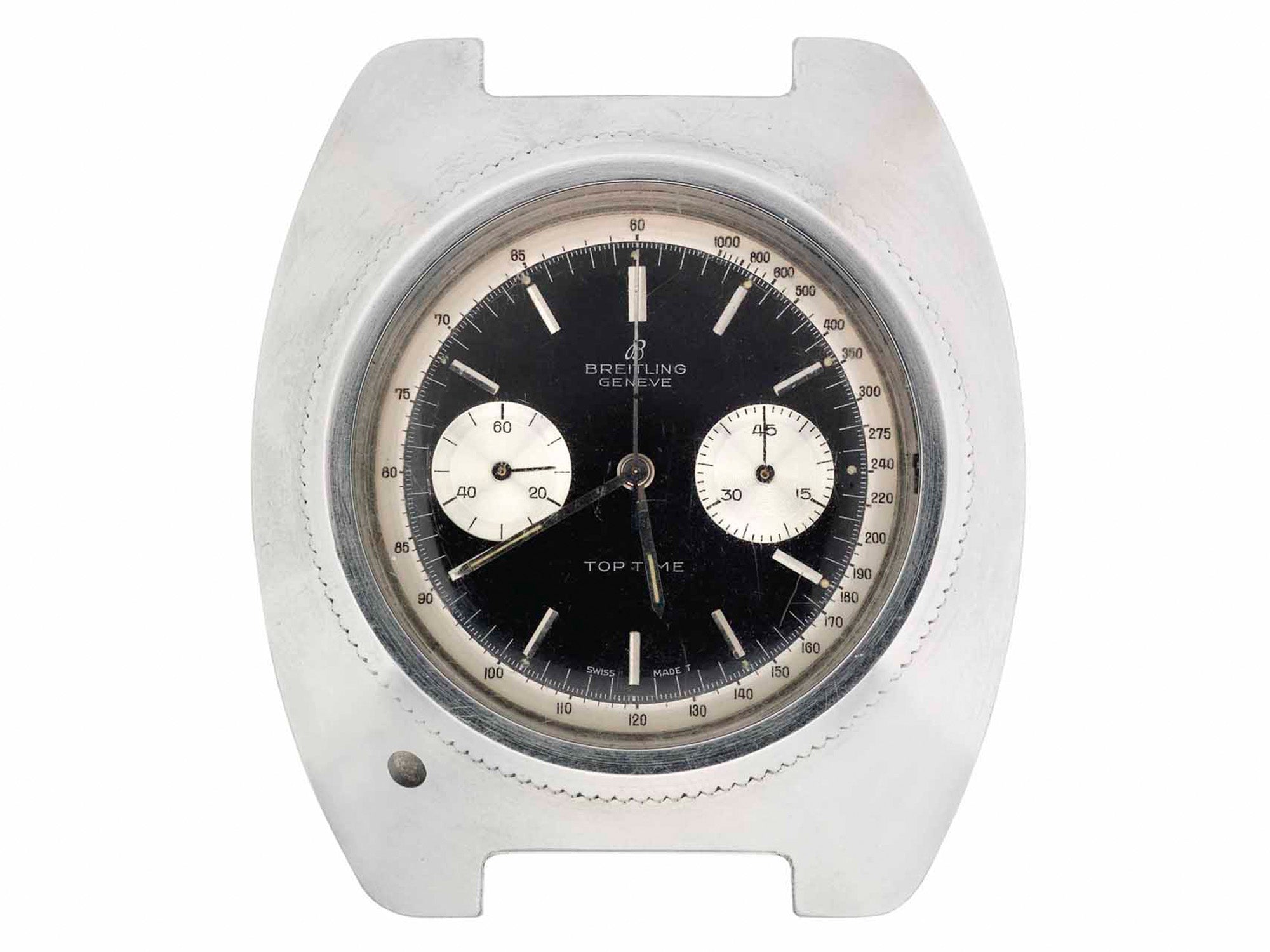
In 1965’s Thunderball, the fourth movie in the popular series starring Ian Fleming’s Agent 007, star Sean Connery spends most of his screen time wearing the same watch that he wore in his previous three outings as Bond: a Rolex Submariner Ref. 6538, now known by many collectors as the quintessential “James Bond Rolex.” However, in one key scene, Bond swaps out the Submariner for another watch: a heavily modified Breitling Top Time Ref. 2002, a steel-cased, black-dialed chronograph with two white subdials, applied baton hour markers, and a tachymeter scale surrounding the dial. (The actual watch is pictured above, sans strap, photo via Christie's.)
In the movie’s fictional universe, the watch — one of many gadget-packed timepieces assigned to Bond by MI-6 weapons supplier Q throughout the film series — is also equipped with a built-in Geiger counter; Bond uses it to track a cache of stolen nuclear warheads hidden deep underwater by his adversaries from the criminal organization SPECTRE.
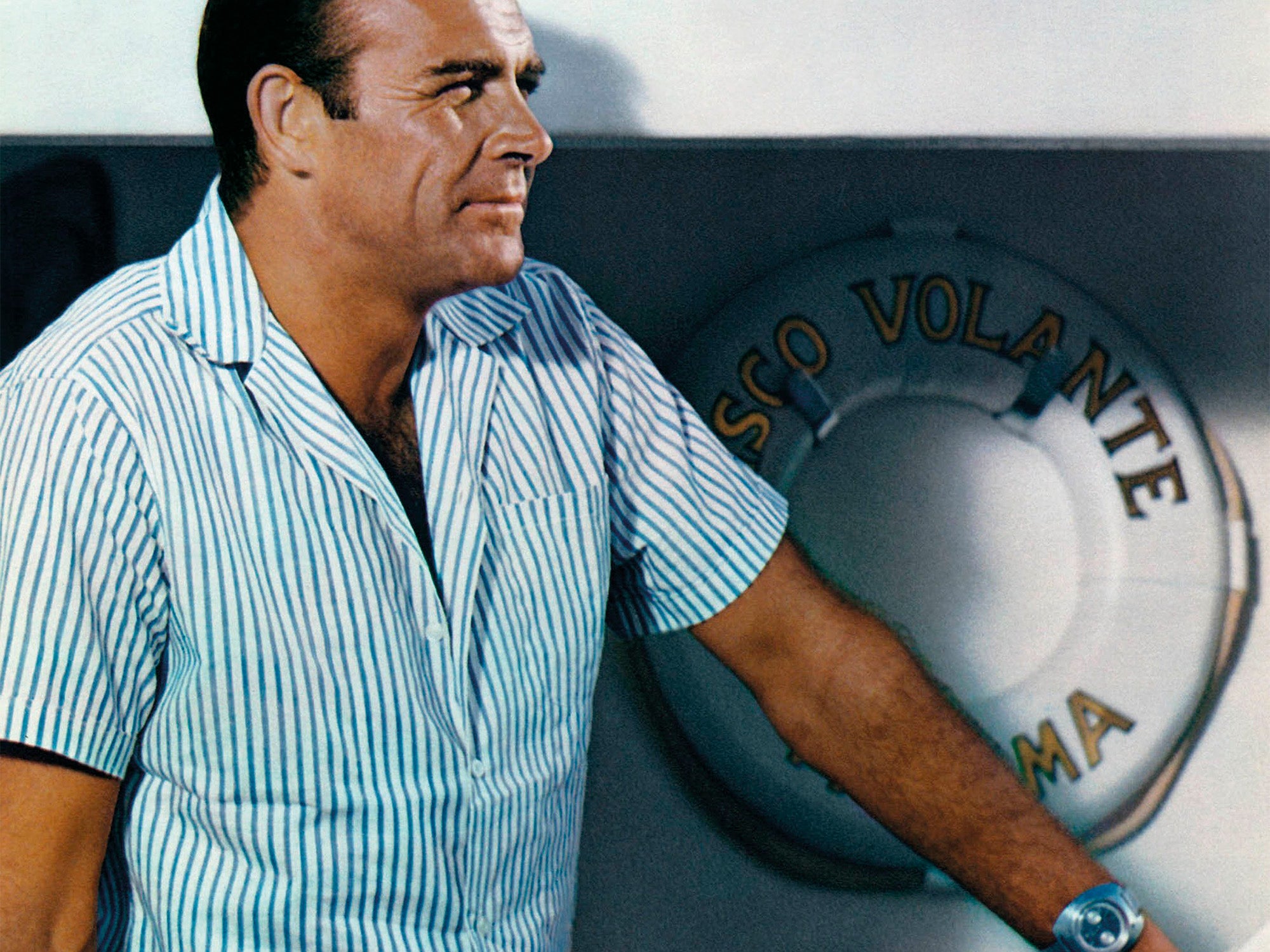
The watch was the only Breitling ever worn by any James Bond actor on screen — though, interestingly enough, another Breitling, a Navitimer 806, also appeared briefly in Thunderball, on the wrist of one of Bond’s foes. The prop “Geiger counter” version of the watch used in the film, after years off the radar of collectors, surfaced in 2013 — at either a flea market or a garage sale, legend has it — and became one of the most expensive Breitling timepieces ever sold. Bought for a mere 25 British pounds, it was sold later that year at a Christie’s auction for more than GBP 100,000. Perhaps the eye-opening sale convinced Breitling that the Top Time, which at that point had been off the market for decades, was ripe for a return in the 21st Century.
1964: Willy Breitling Aims for the Top
The Breitling Top Time watch that made its appearance in Thunderball had been introduced to the market only one year prior, in 1964. Willy Breitling, the third-generation scion of the founding family who ran Breitling SA from 1927 to 1978 — and whose most famous contribution to horological history was the invention of the Navitimer in 1952 — realized around the dawn of the 1960s that chronographs, a Breitling specialty since its founding in 1884, were breaking out of their traditional role as timing tools and growing in mainstream appeal. This realization led Willy to develop a chronograph watch for a younger, more active generation of wearers, an unconventional timepiece that was more “style object” than “tool watch.” Designs began in 1962 and two years later, the model hit the market to swift success, gaining a fan base among style-conscious young adults, particularly those also interested in the era’s muscle cars and motorbikes. The Top Time was notable for its monocoque case that enhanced its water-resistance, its mushroom-style chronograph pushers, its easy-to-remember alliterative name, and the dynamic versatility of its dial options: the Top Time offered three different chronograph scales on its border: a tachymeter for calculating driving speeds, a pulsometer for checking heart rates, or a decimal scale for making precise stopwatch calculations to the 1/10th second.
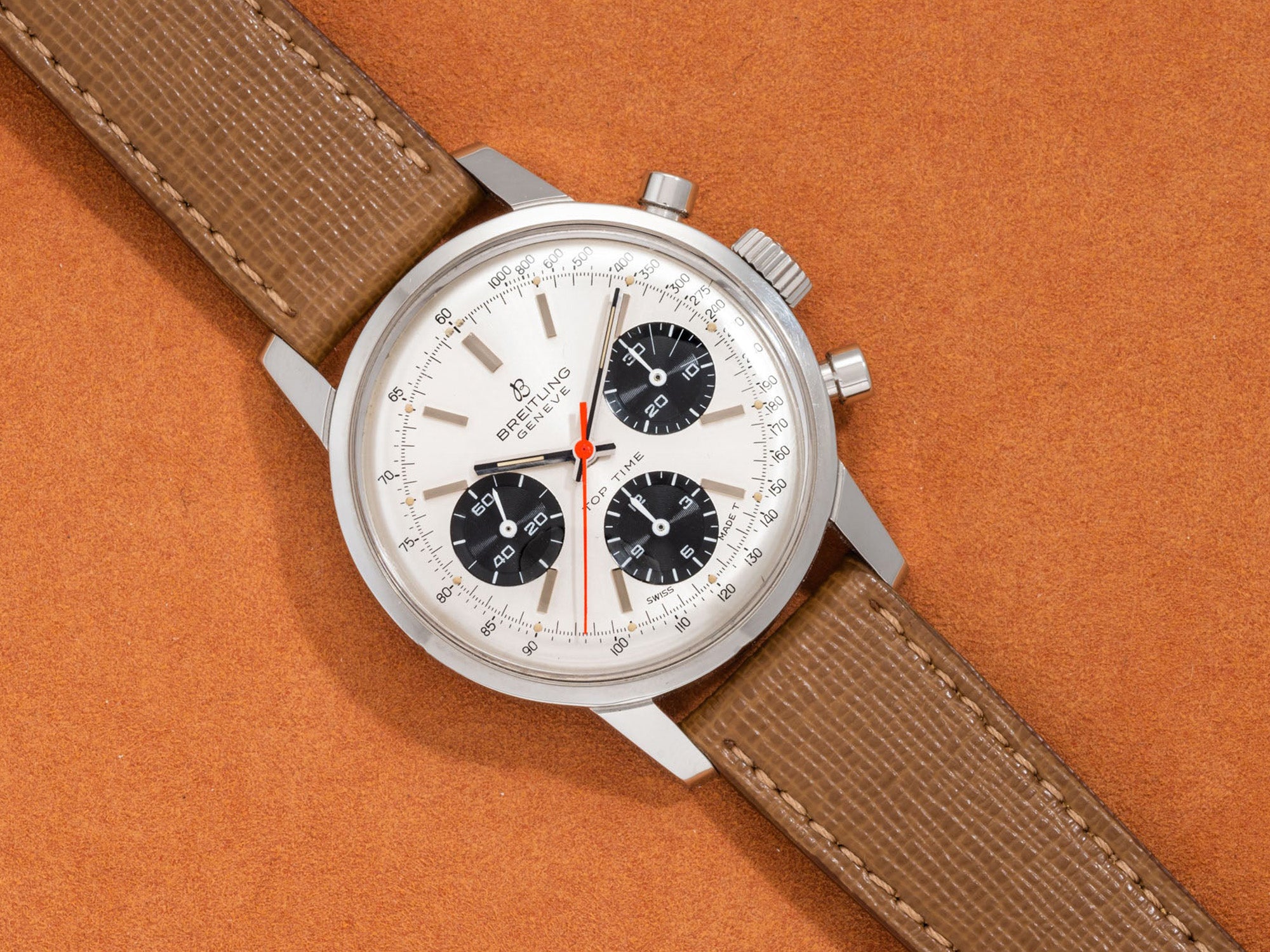
The Top Time remained in production until the late 1970s, with a variety of bicolor dial options, like the "panda" version above, photo via Analog:Shift) and outfitted with manually wound chronograph calibers from the likes of Venus and Valjoux (the latter eventually bought the former, then was itself acquired by ETA in a further consolidation for the Swiss watch movement-making industry.) Willy Breitling died in 1979, shortly after selling the family business — which like many other traditional Swiss watch firms had fallen upon hard times during the 1970s Quartz Crisis — to engineer and former Swiss armed forces pilot Ernest Schneider. After a brief hiatus in production, Schneider reopened Breitling in 1982, with a new focus on its aviation history. The Top Time, a relic of the 1960s car culture, did not fit that mold and would not return to the retooled company’s lineup for several decades.
2020: The Return of Zorro
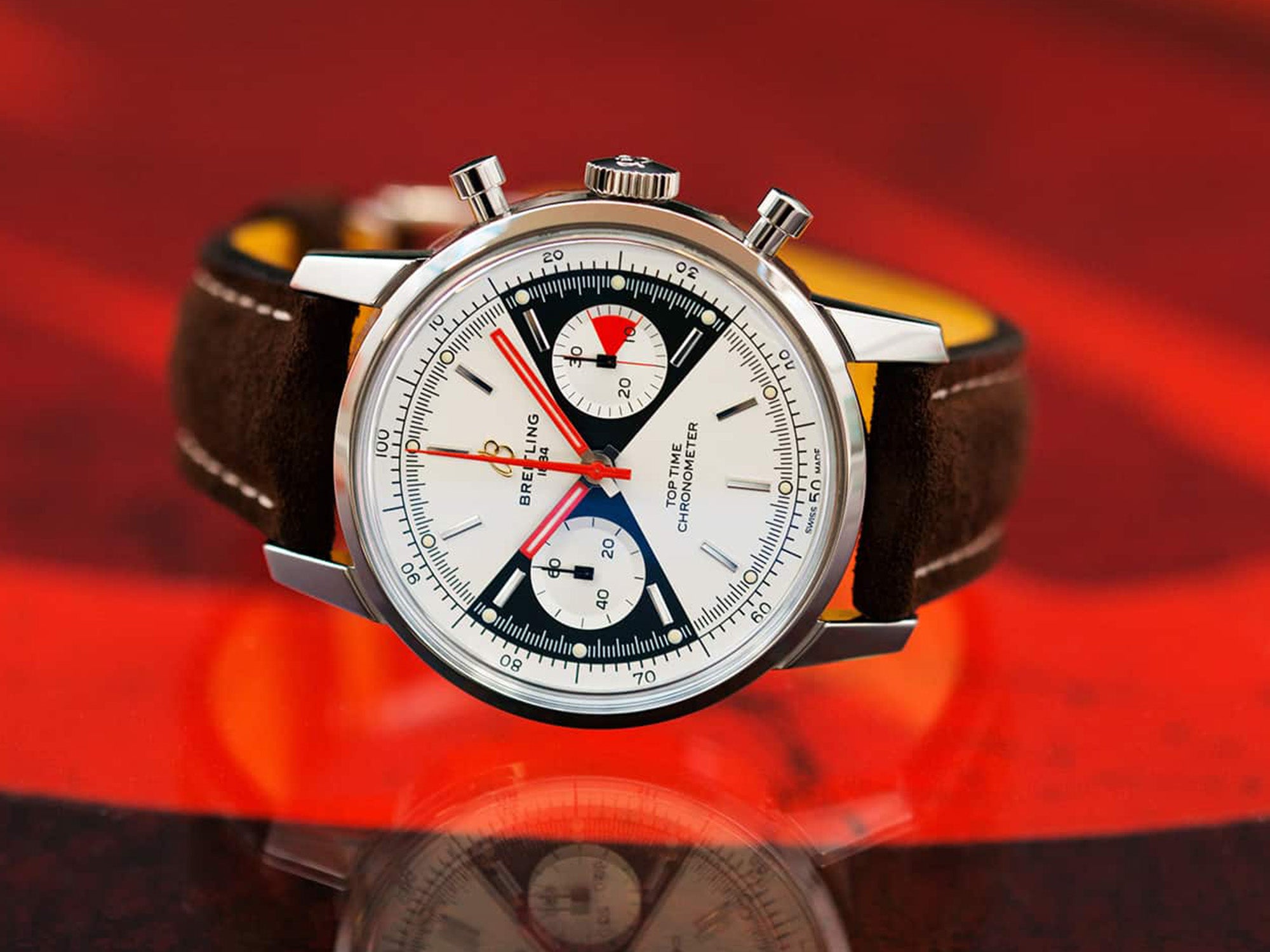
Ernest Schneider and his son Teddy, who’d succeeded him at the helm of the company, sold Breitling to an investment group in 2018. Its new CEO, former IWC executive Georges Kern, came aboard with a mission to bring diversity back to Breitling’s family of products. In 2020, with the watch industry and its chroniclers all swimming against the oppressive tide of the Covid-19 pandemic, Kern’s Breitling offered something for the watch community to get excited about, as well as one of the brand’s most unexpected releases in years: a limited-edition reissue of the Top Time done up in aggressively retro Sixties style. Based on a 1960s model (albeit not the black-dialed model from Thunderball), the watch sports two parallel white subdials, sectioned off from the white main dial by a black domino-mask motif, which gave the original model the nickname “Zorro.” The stainless steel case measures 41mm, with the retro-style pump pushers on the side, and a thin sloping bezel to frame the dial and its tachymeter-scale border. Red details on the hands and the chronograph counter at 3 o’clock evoke the Swinging Sixties style embodied by the original model. The movement in the 2,000-piece limited edition is the Breitling Caliber 23, an automatic movement based on the ETA 7753 that stores a 48-hour power reserve.
2021: Classic Car Revival
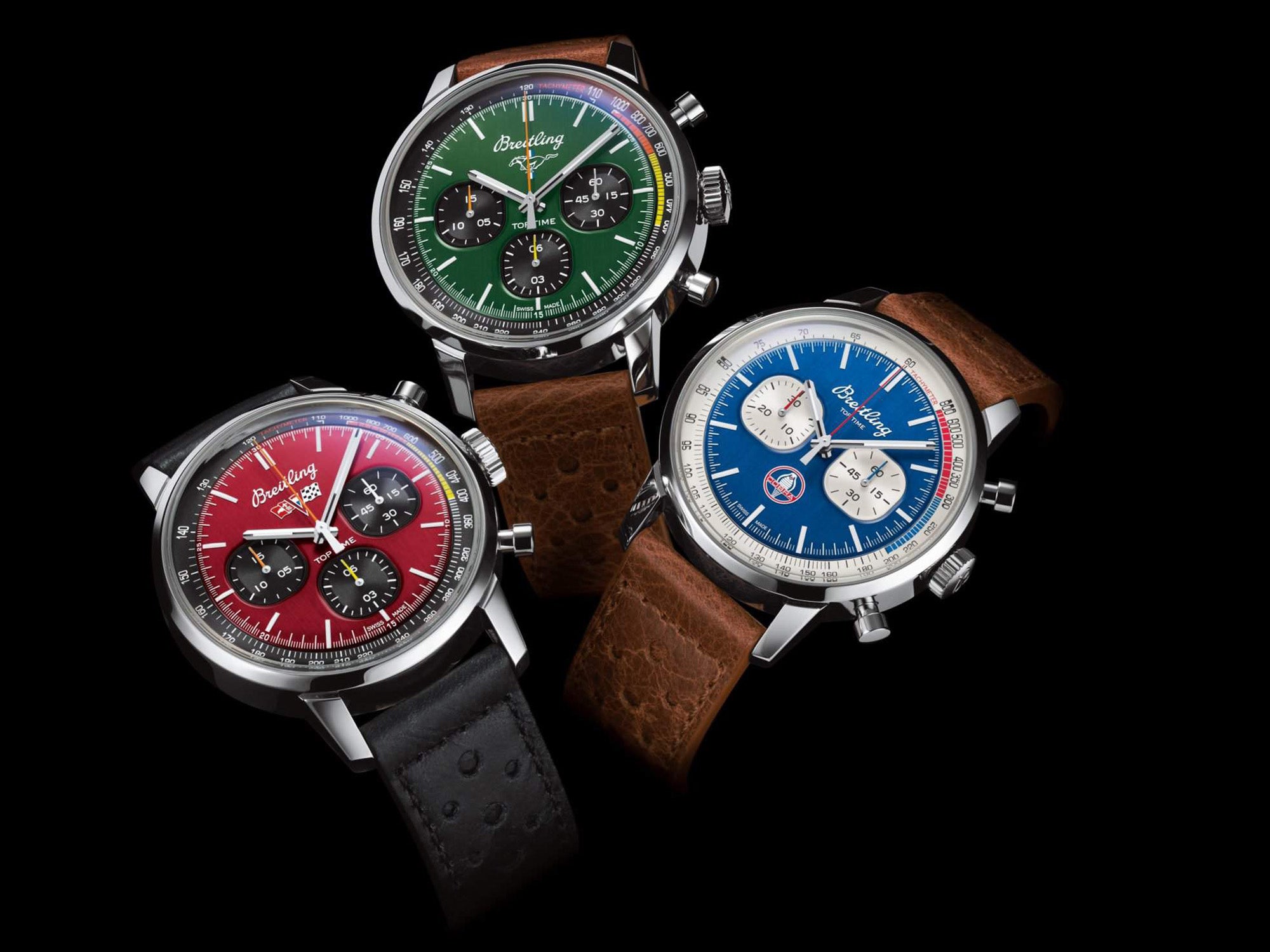
One year after the very successful relaunch of the Top Time, Breitling leaned into the model’s historical association with cars and road racing to develop the first Top Time Classic Cars capsule collection — three chronographs each taking inspiration from one of the automotive icons of mid-20th Century America: the Chevrolet Corvette, Ford Mustang, and Shelby Cobra. The Corvette edition features a black-and-red colorway that evokes the styling of the legendary 1960s “Stingray'' while the Mustang wears the dark green-and-black livery of Ford’s original 1964 “pony car.” Both the Corvette and Mustang models sport a tricompax dial design with a tachymeter scale, and their 42mm steel cases contain the ETA-based Breitling Caliber 25, based on the ETA 2892.
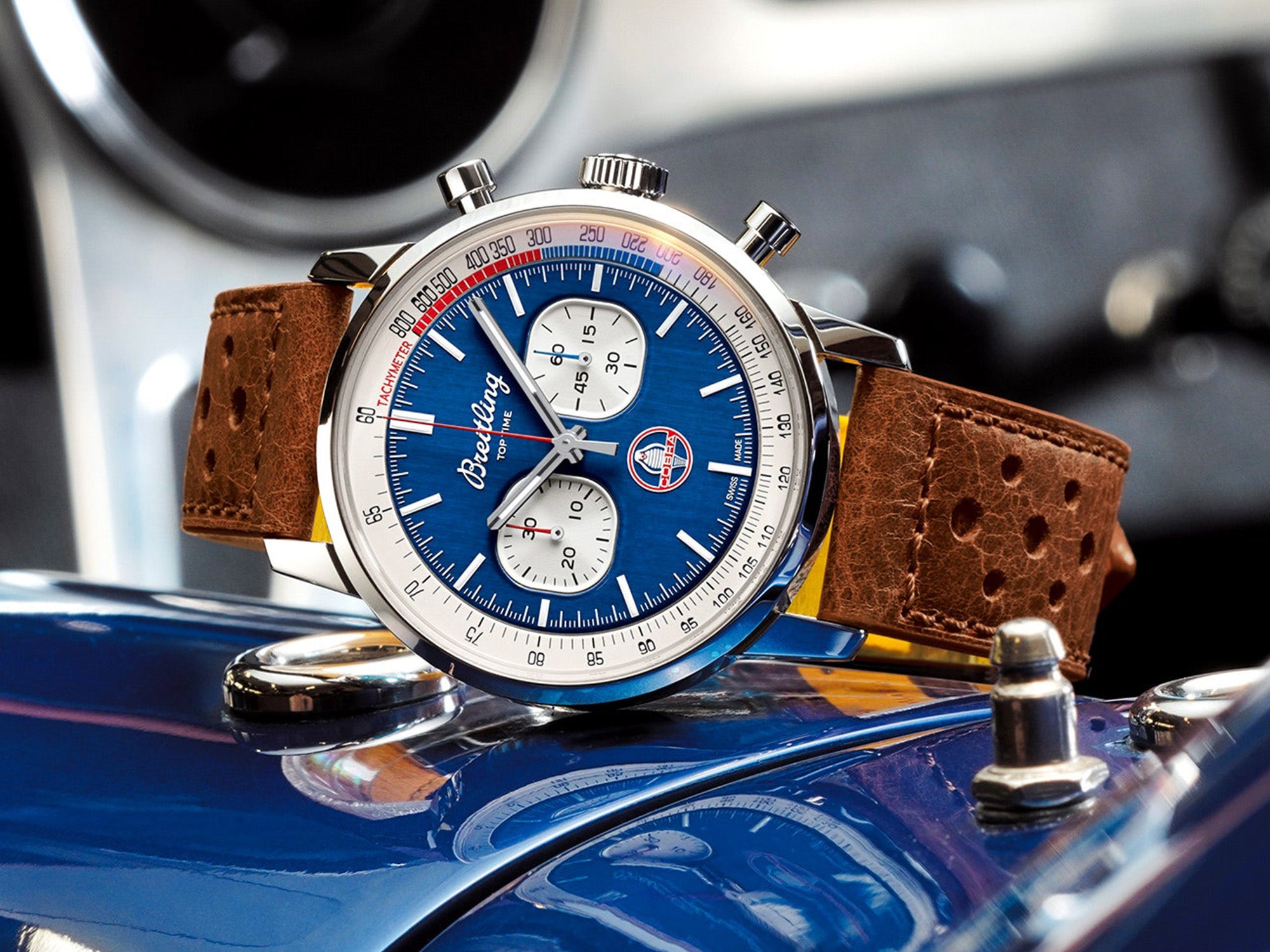 The Top Time Shelby Cobra edition (above), based on the two-seater sports car designed by retired American racing driver Carroll Shelby in 1964, stands subtly apart from its siblings, with a smaller 40mm steel case, a bicompax dial, and a slightly different movement, the self-winding Breitling Caliber 41, also based on the ETA 2892 but supporting just a 30-minute counter rather than an additional 6-hour counter. The dial is bright blue, with contrasting white subdials and white tachymeter scale; replacing a third subdial at 6 o’clock is the classic Shelby Cobra logo. The subdials on the Top Time, whether they number two or three, are notable in their own right: a close look reveals that they’re not strictly round, but softly squared at the corners, similar to a gauge on a car’s dashboard. (Breitling refers to this emblematic shape as a “squircle.”) Top Time watches of all types are delivered on leather straps with perforations in the classical style of driving gloves.
The Top Time Shelby Cobra edition (above), based on the two-seater sports car designed by retired American racing driver Carroll Shelby in 1964, stands subtly apart from its siblings, with a smaller 40mm steel case, a bicompax dial, and a slightly different movement, the self-winding Breitling Caliber 41, also based on the ETA 2892 but supporting just a 30-minute counter rather than an additional 6-hour counter. The dial is bright blue, with contrasting white subdials and white tachymeter scale; replacing a third subdial at 6 o’clock is the classic Shelby Cobra logo. The subdials on the Top Time, whether they number two or three, are notable in their own right: a close look reveals that they’re not strictly round, but softly squared at the corners, similar to a gauge on a car’s dashboard. (Breitling refers to this emblematic shape as a “squircle.”) Top Time watches of all types are delivered on leather straps with perforations in the classical style of driving gloves.
2022: Café Racer Rally
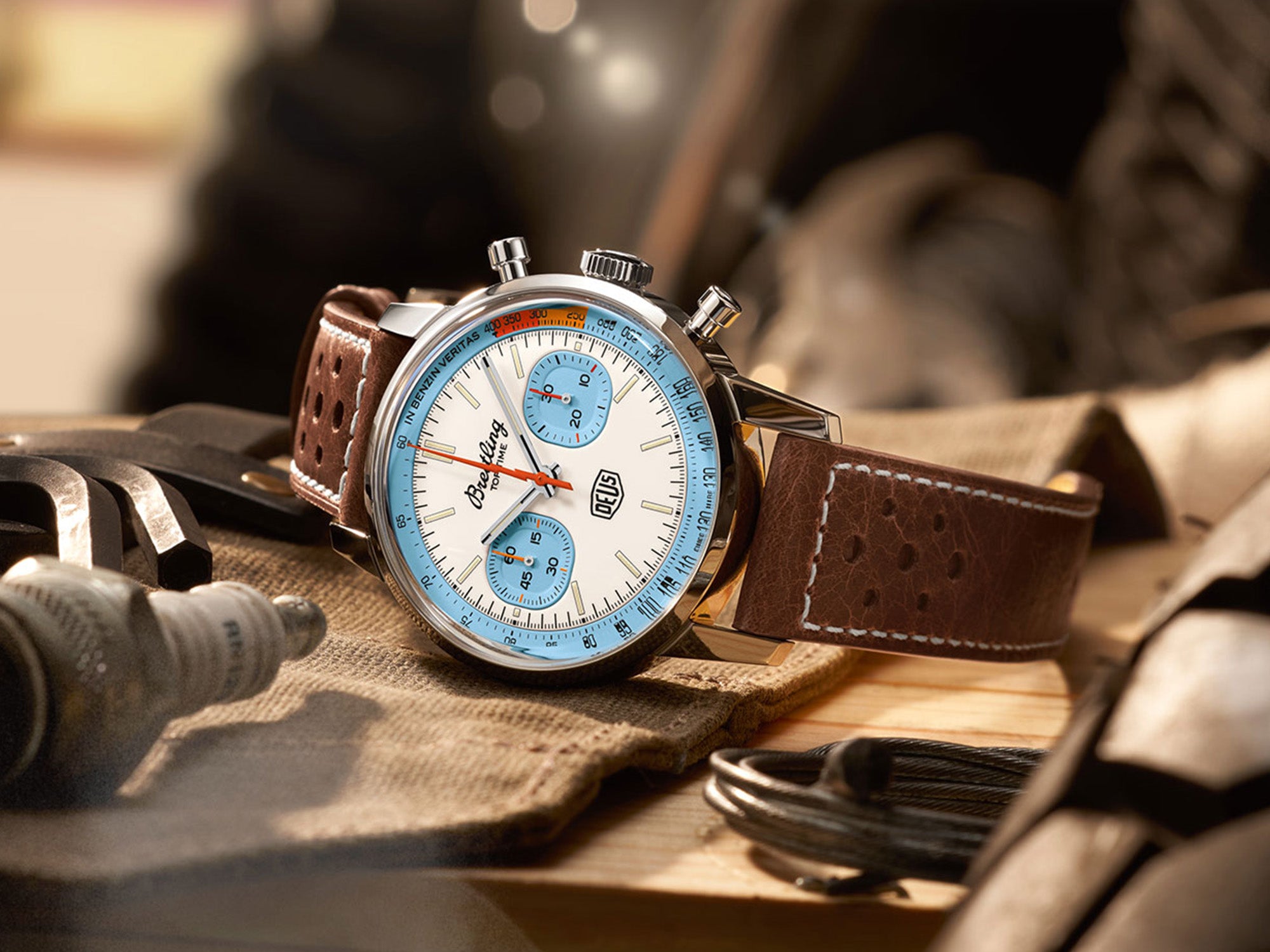 Following up the success of the Classic Cars capsule collection, Breitling expanded its scope of street-racing influences by unveiling additional Top Time models that pay homage to some of America’s most beloved and iconic motorcycles — specifically the so-called “cafe racers” that spawned their own hipster subculture in the 1960s. The first Top Time Deus, a limited edition of 2,000 pieces, launched in 2021, shorty after the Classic Car series, the product of a collaboration between the Swiss watchmaker and Deus Ex Machina, an Australian “lifestyle brand” and customizer of motorbikes. Outfitted with the ETA-based Caliber 23, the first Deus edition has a silver dial with two black “squircle” subdials, a red lightning-bolt-shaped central chronograph hand, and a Deus logo at 6 o’clock. The cashback bears an engraved image of a classic motorcycle and the black tachymeter scale includes the Latin phrase, “In Benzin Veritas” (In Petrol We Trust), the Deus company motto. Another, even more eye-catching Deus limited edition (above) followed a year later, with the same case and movement fronted by a crisp, white lacquered dial with an almost-pastel sky blue color for the subdials and peripheral tachymeter scale. The sky-blue scale, with the Deus motto, is broken up only by a fiery splash of red and orange in the sector between 10 and 15.
Following up the success of the Classic Cars capsule collection, Breitling expanded its scope of street-racing influences by unveiling additional Top Time models that pay homage to some of America’s most beloved and iconic motorcycles — specifically the so-called “cafe racers” that spawned their own hipster subculture in the 1960s. The first Top Time Deus, a limited edition of 2,000 pieces, launched in 2021, shorty after the Classic Car series, the product of a collaboration between the Swiss watchmaker and Deus Ex Machina, an Australian “lifestyle brand” and customizer of motorbikes. Outfitted with the ETA-based Caliber 23, the first Deus edition has a silver dial with two black “squircle” subdials, a red lightning-bolt-shaped central chronograph hand, and a Deus logo at 6 o’clock. The cashback bears an engraved image of a classic motorcycle and the black tachymeter scale includes the Latin phrase, “In Benzin Veritas” (In Petrol We Trust), the Deus company motto. Another, even more eye-catching Deus limited edition (above) followed a year later, with the same case and movement fronted by a crisp, white lacquered dial with an almost-pastel sky blue color for the subdials and peripheral tachymeter scale. The sky-blue scale, with the Deus motto, is broken up only by a fiery splash of red and orange in the sector between 10 and 15.
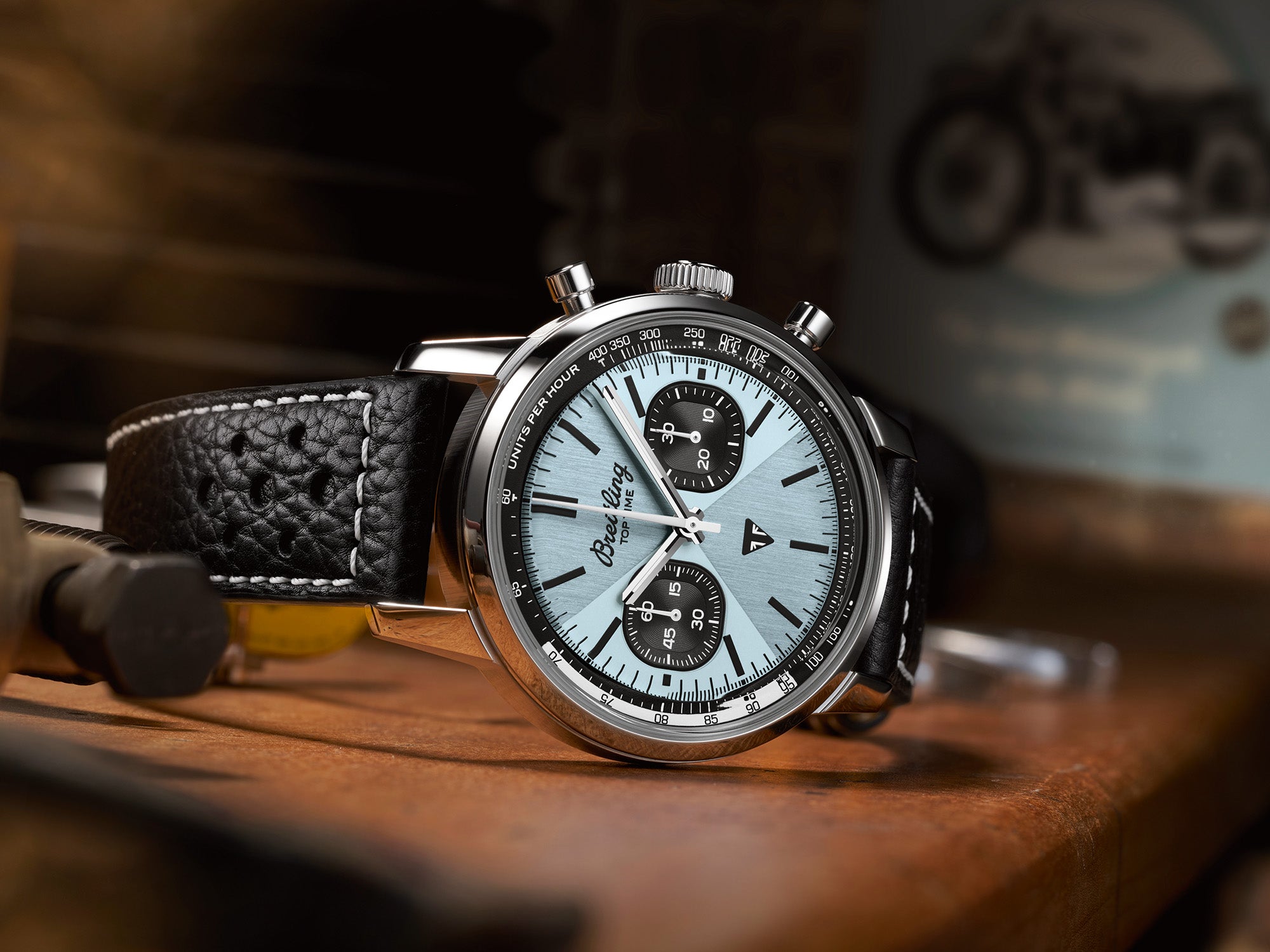
Also in 2022, Breitling built upon a previously established partnership with UK-based Triumph Motorcycles to launch one of the sleekest Top Time models to date, the Top Time Triumph, whose metallic-finished, ice-blue dial with black subdials was created to be perfectly color-matched with Triumph’s Thunderbird 6T motorcycle from 1951, a favorite of collectors and enthusiasts. The watch, which bears both the Breitling and Triumph logos on the dial, was released alongside a limited-edition, co-branded motorcycle, the Triumph Speed Twin Breitling Limited Edition; both timepiece and bike are limited to just 270 pieces. Aside from its rarity and its exclusive pedigree, the Top Time Triumph is noteworthy for being the first in the 1960s-inspired series — though definitely not the last — to contain a Breitling in-house movement, the automatic Caliber B01.
2023: A Triumvirate of Tourbillons
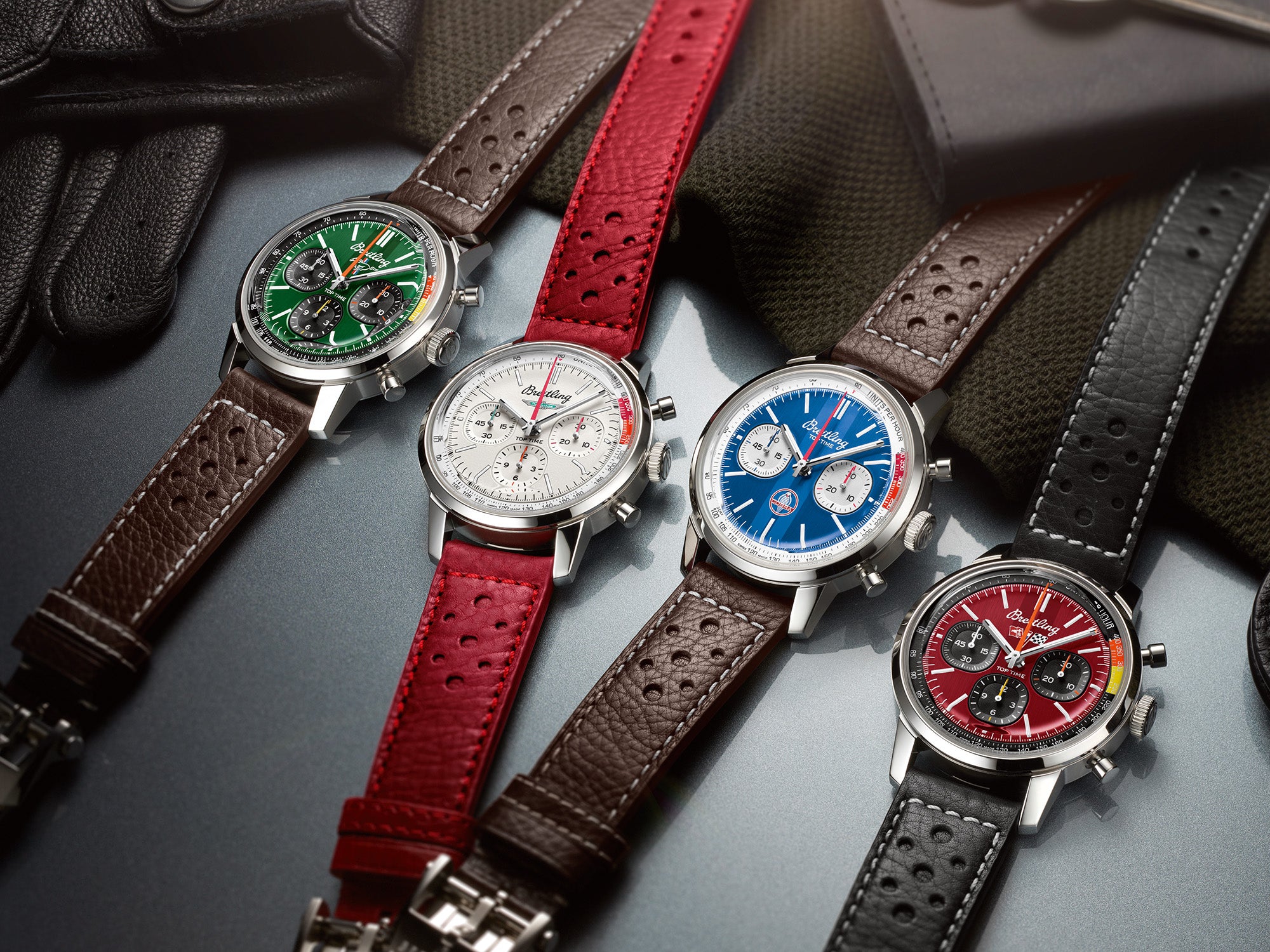
Breilting’s strategy for the Top Time collection in 2023 began, as seasoned industry watchers might expect, with an upgrade to their mechanical engines. The Top Time B01 Classic Cars watches released in May of that year were the first models in the series to be equipped with the manufacture Caliber B01, which Breitling introduced in 2009 and has been animating many watches in all of its product families since. The movement, with its column-wheel architecture, extended 70-hour power reserve, and COSC chronometer certification, replaced the ETA- and Sellita-based movements of earlier generations and also pushed the watches into a more luxurious tier of pricing. To lend momentum to the new B01 versions of the Classic Cars series, Breitling also expanded the original trio into a quartet in 2023, adding the Ford Thunderbird edition (second from left, above), paying tribute to the luxury sports car produced by the American automaker from 1955 through 2005 and whose vintage T-Bird emblem on the dial is executed in a minty “petrol green,” contrasting with the predominantly white dial and bright red, perforated strap.
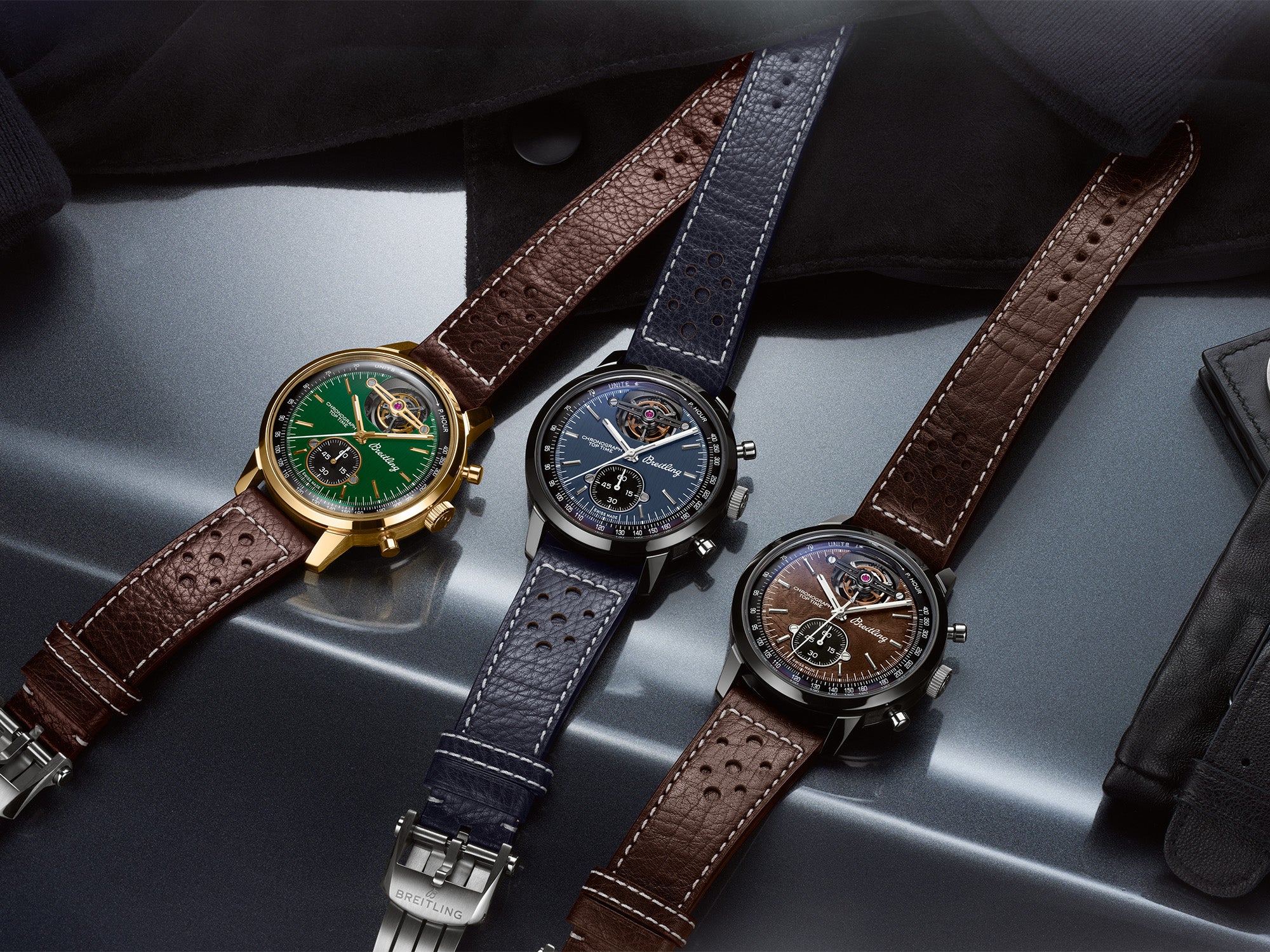
The most notable additions to the Top Time Classic Cars series came toward the end of Breitling’s 2023 “model year,” namely the first models to be outfitted with Breitling’s proprietary Caliber B21, which offers the rare horological combo of a chronograph and a tourbillon. Created in partnership with the Swiss complication specialists of La Joux-Perret, this COSC-certified engine with a 55-hour power reserve also finds itself beating inside cases made of materials that are both exotic and rarely found in Breitling’s current portfolio. For the Top Time B21 Chevrolet Corvette and B21 Shelby Cobra, the case material is black ceramic, with titanium for the caseback, crown, and chronograph pushers, as well as for the buckle on the leather strap. The ceramic cases are 44mm in diameter, a bit larger than their chronograph predecessors. Instead of those watches’ two- or three-register design, the dials hosts a balanced arrangement of an aperture for the tourbillon cage at 12 o’clock, directly above a “squircle” subdial at 6 o’clock to tally the chronograph’s elapsed minutes. The dial of the Shelby Cobra is dark blue, like the livery of the original car, while the dial of the Corvette edition (below) is fashioned from walnut burl, evoking the wooden dashboards of its namesake roadster. The third member of the Classic Cars Tourbillon team is the B21 Ford Mustang. Its case, slightly smaller than its siblings’ at 43mm, is made of bronze, with a titanium caseback, crown, and pushers, and a green dial that echoes the paint job of the first-generation Mustang produced until 1974.
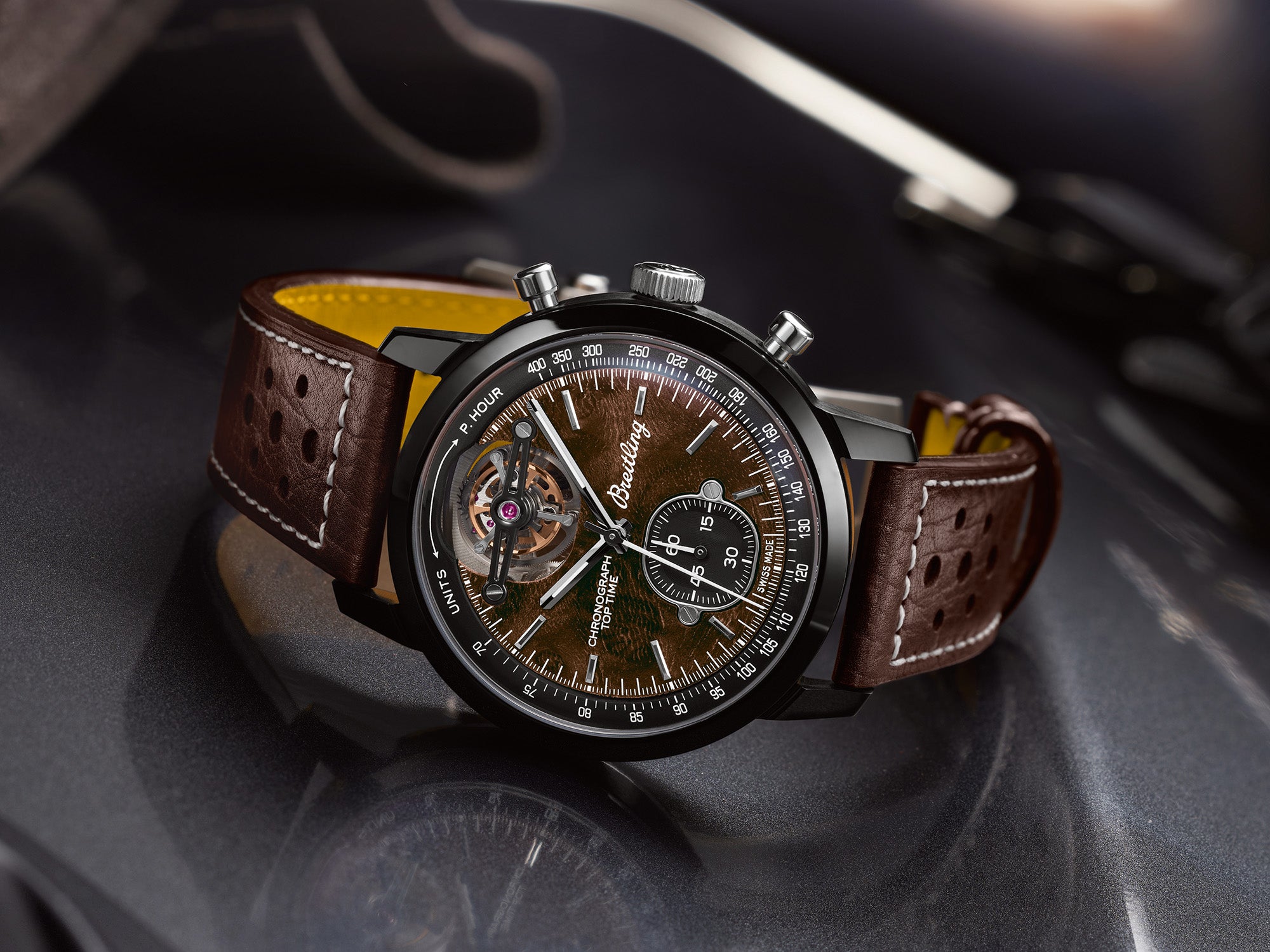



















































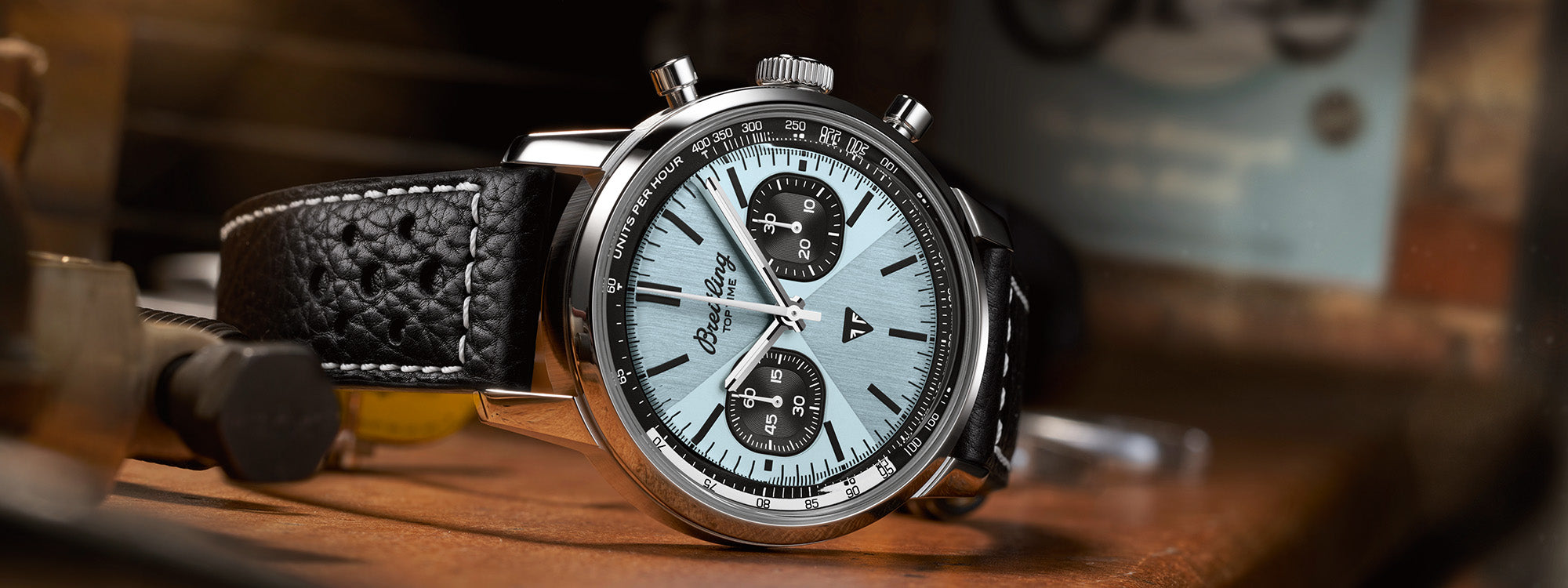












1 Comment
I have a Breitling Superocean Heritage and am interested in the history of Breitling. The Top Time watches always catch my eye when m at the boutique. This was a well written, well researched, enjoyable piece to read.